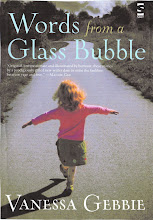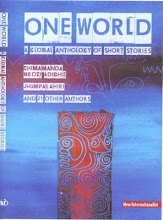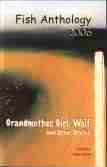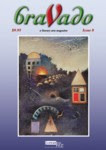Those moments, those self-indulgent moments, come most frequently I've noticed, in descriptive passages. Where the writer loses the plot, almost literally, and disappears up their own pen (!) in flights of fancy, almost listing the senses in an attempt to create something 'real'. And the effect is the opposite. To kill reality.
We are told on courses, 'Use the senses' - but that does not mean list them as if you are ticking them off on your fingers as you write!!
While I was away, there were two super stops on the Short Circuit tour - both of which I will flag later - but one, at Women Rule Writer, with the great Nuala ni Chonchuir, picked up on this - on using the senses. See here.
But this is great. Here is an article written by Bernadine Evaristo. Published in Mslexia, it is a marvellous look at using the senses in fiction. Complete with this great saying,
""Writing fiction is not an academic exercise but an imaginative one. Knowing all the literary terms and jargon is sometimes useful and might impress others, but it won’t make you a great writer. Understanding craft, however, whether it’s instinctive or learned, is another matter altogether."
And, from Nuala's blog, her question and my reply...
One of my favourite essays in the book is by Paul Magrs; I love the amount of solid advice he packs into his piece while maintaining a very down-to-earth approach. I think his advice might work best for experienced writers – novices may be scared by statements such as: ‘How come it’s only paragraph one and you are already up your own arse?’ (!)
A salient point he makes is, ‘Don’t forget to appeal to all our senses.’ (Using colour, food, sex etc. in stories.) What are your own feelings on the importance of including all things sensual in the short story?
Guardedly, V replies, it is important, obviously, to allow our reader to experience the world you create for them. But. How many pieces have I read where the senses have been a bit shoehorned in, almost as though the writer was ticking them off on their fingers as they wrote.
'The smell of the sea rose through the open window together with the raucous cries of seagulls tussling over some scraps on the pavement outside the café. The coffee this morning tasted so bitter. But it always smelled so good first – it was unfair. But then life was unfair. Hugo picked at a loose thread on his jacket sleeve – the rough tweed, browns and golds if you got close enough to it, felt rough under his fingers, like that old jacket of his father’s that used to small of tobacco and mint – his father always had Polos hidden in the pockets for the ponies…'
Blah blah blah…
blah blah blah...
see what I mean??!
Here's the link to the MSLEXIA article again - in case...
and HERE is Bernadine Evaristo's website.




.JPG)























7 comments:
Oh, thank you! You've explained so well the things that have troubled me in the land of writing. I belong to a writing group where too many times I must read such descriptive miasma.
Then the comments left by other members in the group are quite laudatory about the "lushness, the richness" of the writing.
Yes, heavy handed description is like cooking with spices. Too much ruins the taste.
I came here for a visit from Nik Perring's place :)
You have a lovely, interesting, informative blog!
Everything in moderation, eh, V?
Congrats on the Arts Council dosh, btw. Nice one.
Nuala x
I loved what was said about this on the fab Nuala's blog. It's soooo true. It's about the story and the characters; it is NOT about the writer - the writer should remain unseen.
Actually, to go a little further (or perhaps sideways) when you look at a piece of art, that's all you need to see; you don't need the artist next to you telling you how (s)he did this or how clever they were in achieving that, do you? (Unless you're interested and want to find out for yourself, of course.)
Nik
Hi Marisa, thanks for dropping by, and for the kind words. Writing groups, who'd have em, eh?! (no- dont take that seriously - good writing groups are like gold dust).
Oh, I guess that sort of feedback is fine if it is from a writer who has many many high-level publications with the lovely lush rich language in their work... but isnt it funny how it is rarely the case?! I love the cooking analogy.
Hi N yup - everything indeed. And ta for the congrats, I will get round to blogging about that too, sometime!
And Nik - I love the anology here as well. Are we all writers or summat, with these here analogies? Yes, with works of art, I want to be left alone to feel the relationshop betwee me and what Im seeing. I do NOT want to be told what to feel.
I remember going to see the Turner prize shortlist a few years back. One exhibit seemed to be small canvasses painted white.
The explanation pinned next to them was bigger than the canvase- to the effect that each one had many many layers of different coloured paint beneath the white final layer... and the experience was apparently the wonderment of thinking what they might be. The challenge of imagining, feeling the cover-ups, the loss of colour.
Oh God what bullshit! It was ALL about the artist, and not the work.
Personally, I'm a huge fan of "sensual" writing (hence my massive enthusiasm for writers like Dickens, Zola, Poe etc.) and think it's sad that fewer "great" writers nowadays are presenting us with such incredibly vivid sensory feasts. If anyone knows of writers who are producing this kind of work, please let me know who to look out for!!! I do take the point that if a reader is keen to get on with following the action/character development etc. then long, descriptive passages can be somewhat tedious to wade through, but on the other hand, for the sensualists amongst us, such passages are pure delight, if well done.
Hi Lyuba
Oh - please dont get me wrong - I havent explained right, perhaps? In the right place, fantastic flights of sensory language are terrific. I love them too.
It is when writers attempt to stick those in all over the place, just because they feel like it - not because the piece of work needs it... that's when I wonder if problems can arise??
Oh, yes! And that chap with polos in his pockets for the ponies needs a good slap. Feeding polos to ponies is a no-no: it makes them bite-y, as any fule kno (;-)!).
Always felt Stella Gibbons nailed the problem of irritating authorial intrusion in 'Cold Comfort Farm', where she flags up in advance all those dreadfully self-indulgent 'purple passages'.
And what's this about dosh, Missus? Congrats seem to be in order, in which case - here are lots of 'em!
Post a Comment